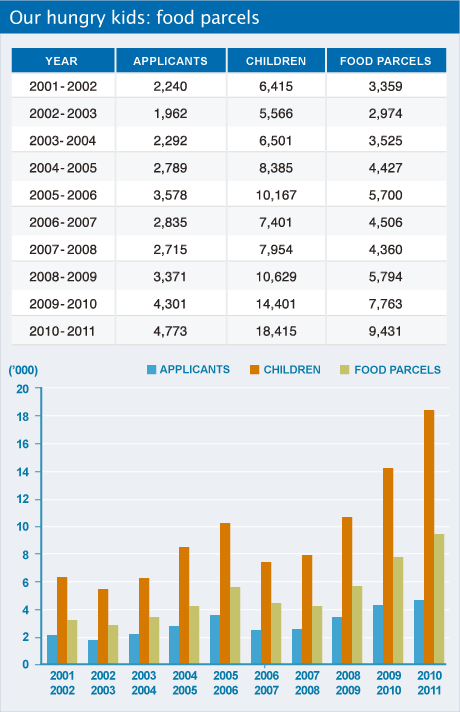
The families of more than 50,000 children have received food parcels from two charities in the past year, roughly double pre-recession numbers.
Families seeking food parcels from the Salvation Army's 54 foodbanks jumped from 15,239 in 2007 to 27,612 - with 34,482 children between them - in the year to
last month.
The number of families fed by 70 Auckland foodbanks supplied through the Auckland City Mission increased faster from 2715 families with 7954 children in 2007 to 4783 families with 18,415 children in the past year.
The 52,897 children fed by the two charities in the past year were 5 per cent of the country's 1,083,000 children under age 18.
A Ministry of Health national survey in 2002 found 10 per cent of all households used food banks or food grants in the previous year - only 1.5 per cent of the richest fifth of households but 20 per cent of the poorest fifth.
The near-doubling of families using Salvation Army or City Mission food parcels since then suggests those proportions may also have roughly doubled.
A Child Poverty Action Group report in 2005 said the number of foodbanks "exploded" after welfare benefits were cut in 1991. The cuts have never been reversed.
Auckland City Missioner Diane Robertson said that what started as a "crisis" had become, 20 years later, "chronic ongoing issues" as families on benefits and low incomes fell deeper into debt.
"People have such huge levels of debt already. A lot of it is to Work and Income," she said.
Debt was the biggest single reason for seeking food parcels from the mission in the past year, accounting for 34 per cent of requests for food.
Food costs were the next biggest reason (30 per cent), followed by rent (11 per cent), car and transport costs (10 per cent), power, gas and phone bills (7 per cent) and medical costs (5 per cent).
Both the mission and the Salvation Army provide budget advice when families seek food parcels, but Ms Robertson said even budget advisers could not always close the gap between people's income and living costs.
"People just can't live on what they've got. When they do a budget they have a deficit, so they default on food and look for charities to pick it up," she said.
Many families lost fulltime or part-time work in the recession. The number of people receiving unemployment benefits started to fall this year but was still at 56,264 at the end of last month, down slightly from 62,085 a year earlier but far above the 17,710 of June 2008.
"The recession hit people at the lowest end - those who are in cleaning, construction, working on boats," Ms Robertson said.
"Those jobs just quietly disappeared. They are not quietly coming back again."
Salvation Army community ministries head Major Pam Waugh said 61 per cent of working-aged families with children who received food parcels from the army in the past year were on benefits, 12 per cent were on wages and 17 per cent had irregular income from short-term and casual work.
Three-quarters of the families were in the 20 to 49 age group - "the parenting age group".
"The other increase has been in grandparents bringing up their grandchildren," she said.
Ms Robertson said the City Mission wanted to know more about the families who needed repeat food parcels. It has engaged a researcher to work with 100 families over the next year and report on their problems in depth.
What you can do
Sponsor a hungry child for 50c a day.
(to help provide the basics they're missing out on.)
kidscan.org.nz
Donate to Salvation Army food banks.
salvationarmy.org.nz
Donate to Auckland City Mission winter appeal.
(you can text help to 305 to instantly donate $3.)
aucklandcitymission.org.nz
Use your business or community group to feed hungry kids in your local school or community.



